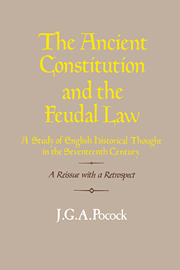 The Ancient Constitution and the Feudal Law
The Ancient Constitution and the Feudal Law Book contents
- Frontmatter
- Contents
- Preface
- Preface to the First Edition
- Part One The Ancient Constitution and the Feudal Law
- I Introductory: the French Prelude to Modern Historiography
- II The Common-law Mind: Custom and the Immemorial
- III The Common-law Mind: the Absence of a Basis of Comparison
- IV The Discovery of Feudalism: French and Scottish Historians
- V The Discovery of Feudalism: Sir Henry Spelman
- VI Interregnum: the Oceana of James Harrington
- VII Interregnum: the First Royalist Reaction and the Response of Sir Matthew Hale
- VIII The Brady Controversy
- IX Conclusion: 1688 in the History of Historiography
- Part Two The Ancient Constitution Revisited: a Retrospect from 1986
- Index
I - Introductory: the French Prelude to Modern Historiography
Published online by Cambridge University Press: 18 November 2009
- Frontmatter
- Contents
- Preface
- Preface to the First Edition
- Part One The Ancient Constitution and the Feudal Law
- I Introductory: the French Prelude to Modern Historiography
- II The Common-law Mind: Custom and the Immemorial
- III The Common-law Mind: the Absence of a Basis of Comparison
- IV The Discovery of Feudalism: French and Scottish Historians
- V The Discovery of Feudalism: Sir Henry Spelman
- VI Interregnum: the Oceana of James Harrington
- VII Interregnum: the First Royalist Reaction and the Response of Sir Matthew Hale
- VIII The Brady Controversy
- IX Conclusion: 1688 in the History of Historiography
- Part Two The Ancient Constitution Revisited: a Retrospect from 1986
- Index
Summary
THIS book has been written in an attempt to throw light upon one aspect of the rise of modern historiography, a movement whose beginnings in general may with some assurance be dated from the sixteenth century. For it was then that the historian's art took on the characteristic, which has ever since distinguished it, of reconstructing the institutions of society in the past and using them as a context in which, and by means of which, to interpret the actions, words and thoughts of the men who lived at that time. That this is the kernel of what we know as historical method needs no demonstration; that it distinguishes modern from ancient historiography may be seen by means of a comparison with the historical methods of the Greeks and Romans. The ancient historians discovered and brilliantly developed the art of constructing an intelligible narrative of human affairs; they described contemporary societies alien to their own and noted the varieties of human conduct and belief that arose in the context of different climates and traditions; but they did not quite reach the point of postulating that there existed, in the past of their own civilization, tracts of time in which the thoughts and actions of men had been so remote in character from those of the present as to be intelligible only if the entire world in which they had occurred were resurrected, described in detail and used to interpret them.
- Type
- Chapter
- Information
- The Ancient Constitution and the Feudal LawA Study of English Historical Thought in the Seventeenth Century, pp. 1 - 29Publisher: Cambridge University PressPrint publication year: 1987
